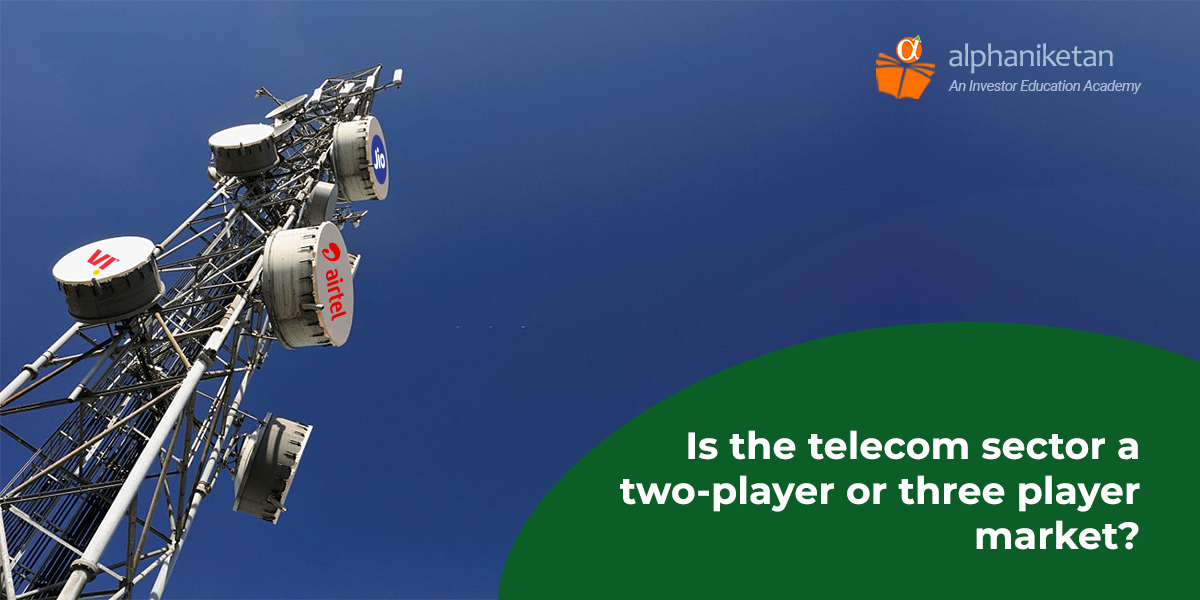“Two’s company, three’s a crowd,” goes the popular idiom. But the same would not be a desirable situation in the Indian telecom industry, currently ruled by three private giants – namely Reliance Jio Infocomm, Bharti Airtel Ltd and Vodafone Idea Ltd (VIL).
The delicate financial health of VIL raises a question whether the Indian telecom market is moving closer to duopoly. All eyes are set on whether the Indian baby of the UK-based Vodafone Plc is able to raise funds and whether the Government extends significant relief measures to the industry. Lenders too have been urging the Government to allow a moratorium on spectrum payments to VIL. Needless to say, this would offer some relief to the stressed telecom major.
Challenges
Let us assess the challenges faced by the company having a market capitalization of Rs 17,183 crore. As on 30 June, the company’s net debt stood at Rs 190,670 crore, which includes deferred spectrum payment obligations of Rs106,000 crore and AGR (adjusted gross revenue) liability of Rs 62,180 crore due to the Government. Additional debt from banks and financial institutions stands at Rs 23,400 crore.
Given the massive debt on the books, it has been challenging for VIL to find itself a white knight. It continues to lose subscribers. During the June quarter (Q1FY22), VIL’s subscriber base was 255.4 million, representing a huge decline of 12.4 million subscribers compared to Q4FY21.
Solutions
Meaningful tariff hikes would help enhance the average revenue per users (ARPUs), which fell around 3% sequentially in the first quarter to Rs 104.
“Tariff hikes are the most critical item facing the industry,” said Ravinder Takkar, MD & CEO, VIL, in the earnings call, adding, “The floor pricing does not have to be a longer-term measure or a permanent thing and can be done in an interim manner…If the health becomes good and there is a disciplined industry, there’s no reason why the floor pricing cannot be taken off at that time.”
The company has taken several tariff interventions in the last couple of months to improve its ARPUs. One of them being augmenting the base postpaid rate for corporate users, which continue to be VIL’s stronghold.
Anticipations
Additionally, even as the company awaits a relief package by both the Government and Department of Telecommunications (DoT), the Government wants promoters of the beleaguered Vodafone Idea — Vodafone Group Plc of the UK and Aditya Birla Group (ABG) — to show their commitment to the India telecom operations by infusing equity.
In this backdrop, it might help to note that the finance ministry has introduced the Taxation Laws (Amendment) Bill, 2021 in Lok Sabha to do away with the contentious retrospective tax demand provisions. This is expected to augur well for Vodafone Group.
If the tide turns in the wrong direction?
If at all VIL fails to hold the guard, the eventual downfall leading to a duopoly is not in the interest of the Government as the company owes a large portion of its debt to the government. Additionally, more the merrier would be the mantra for the Government to garner a wholesome amount from the 5G spectrum auctions.
Further, the lenders and current employees too will suffer if there is a default. Moreover, there would be a massive disruption for telecom users. Migrating Vodafone’s users would be a mammoth task for Airtel and Jio.
In fact, the competitors too have hinted at their inclination towards a three-player industry. As Gopal Vittal, MD and CEO – India & South Asia at Bharti Airtel, recently said, “As a country, we do need three players. This is a large enough country with over 1.3 billion people that can easily accommodate three players plus the Government player.”
As such, the presence of more companies in any industry tends to help the consumers in terms of offering attractive pricing terms and telecom industry is no different.
Therefore, Vodafone’s survival is critical for the industry and the various stakeholders involved. Ensuring this would mean fixing many pieces of the puzzle. Considering that the company has not been able to raise funds, substantial relief measures are anticipated from the Government . Perhaps, regulatory interventions would also be required for overall tariff hikes in the industry.
A combination of both, tariff hikes and government relief, would go a long way in reviving VIL’s fortunes and in turn support the telecom landscape in the country.
Thank you for reading this post, don't forget to subscribe!




